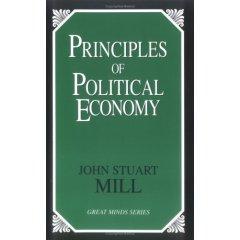| 2020ok Directory of FREE Online Books and FREE eBooks |
Free eBooks > Business & Investing > Economics > Economic History > Principles Of Political Economy
Principles Of Political Economyby John Stuart Mill  Download Book (Respecting the intellectual property of others is utmost important to us, we make every effort to make sure we only link to legitimate sites, such as those sites owned by authors and publishers. If you have any questions about these links, please contact us.) link 1 link 2 link 3 About Book Book Description The standard economics textbook for more than a generation, PRINCIPLES OF POLITICAL ECONOMY, written by John Stuart Mill (1806-1873) in 1848, is as much a synthesis of his predecessors' ideas as an original treatise on economics. Heavily influenced by the work of David Ricardo, and taking ideas from Adam Smith and Thomas Malthus, Mill demonstrates how important economic concept can be applied to realworld situations. Reflecting his utilitarian social philosophy, Mill suggests that social improvements are always possible. He thus proposes modifying a purely laissez-faire system, advocating trade protectionism and regulation of employees' work hours for the benefit of domestic industries and workers' well-being. In such features he displays a leaning toward socialism. For anyone with an interest in the history of economics or the history of ideas, Mill's landmark work still makes for stimulating reading.
Mill's education broadened considerably after 1823 when he entered the East India Company to commence his life's career as his father had done before him. He traveled, became politically involved, and in so doing moved away from the narrower sectarian attitudes in which he had been raised. His ideas and imagination were ignited by the Coleridge, Comte, and de Tocqueville. During his life, Mill wrote many influential works: A SYSTEM OF LOGIC (1843); PRINCIPLES OF POLITICAL ECONOMY (1848); ON LIBERTY (1859); UTILITARIANISM (1863); EXAMINATION OF SIR WILLIAM HAMILTON'S PHILOSOPHY (1865); THE SUBJECTION OF WOMEN (1869); and AUTOBIOGRAPHY (1873). As a defender of individual freedom and human rights, John Stuart Mill lives on as a nineteenth-century champion of social reform. He died on May 7, 1873. Related Free eBooks
| Related Tags |












SEND A COMMENT
PLEASE READ: All comments must be approved before appearing in the thread; time and space constraints prevent all comments from appearing. We will only approve comments that are directly related to the article, use appropriate language and are not attacking the comments of others.